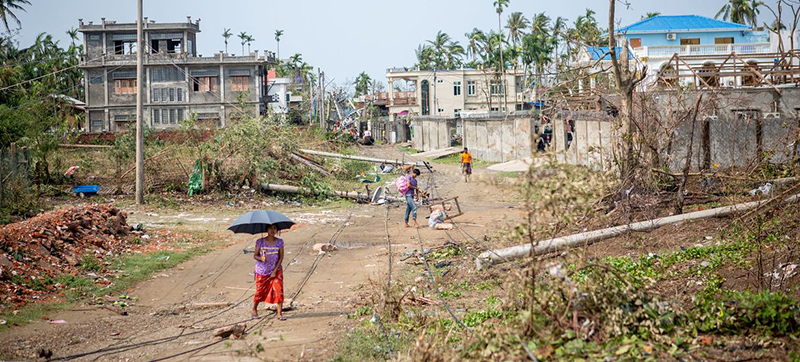 Rakhine
Rakhine
Looming famine in Rakhine signals wider crisis in Myanmar, shows UN report
Up to two million people in Myanmar’s Rakhine state face the dire prospect of famine, amid a broader economic collapse and worsening humanitarian crisis triggered by the military’s 2021 overthrow of the democratically elected government.
In a report released on Thursday, the UN Development Programme (UNDP) described the situation in the poverty-struck province as an “unprecedented disaster”.
“A perfect storm is brewing,” it said, citing a combination of interlinked issues – restrictions on domestic and international flow of goods, hyperinflation, loss of livelihoods, dwindling agricultural production and lack of essential services.
Without urgent action nearly the entire population (about 95 per cent) “will regress into survival mode”, UNDP warned.
“They will be left to fend for themselves amid a drastic reduction in domestic production, skyrocketing prices, widespread unemployment and heightened insecurity.”
Source: WFP price monitoring Skyrocketing pries of essential goods and services in Rakhine (rice, cooking and transport).
Rakhine is home to the mostly-Muslim Rohingya community who fled a brutal military crackdown in 2017 in their hundreds and thousands, in what the former UN High Commissioner for Human Rights Zeid Ra’ad Al Hussein called ethnic cleansing.
Today, nearly one million Rohingya refugees remain in neighbouring Bangladesh, where UN aid teams have had to cut food rations amid major funding shortages.
Collective punishment
Data collected across Rakhine in 2023 and 2024, also pointed to a virtual halt in the state’s economy, with critical sectors such as trade, agriculture and construction nearly at a standstill.
“People’s incomes are collapsing because export-oriented, agrarian livelihoods in Rakhine are disappearing as the domestic and international markets are no longer accessible due to blockades,” UNDP said.
It added that the restrictions put in place by the military’s State Administration Council were “clearly aimed at isolating Rakhine from the rest of the country and exacting ‘collective punishment’ on an already vulnerable population”.
Repercussions beyond borders
UNDP further warned that the recent escalation in manipulating ethnic identity along with an imminent economic catastrophe, will deepen marginalization, disenfranchisement and put intercommunal relationships at even greater risk than ever before.
“As the crisis worsens, the lack of resources and opportunities will continue to fuel tensions and trigger a greater exodus of youth and families…this would have repercussions both within Myanmar and beyond its borders,” it said.
“Without safe avenues for escape, we anticipate an increase in human trafficking, particularly among the vulnerable Rohingya population.”
Knock-on effects
The knock-on effects of the situation Rakhine are contributing to a pattern of internal migration across Myanmar.
As the economic situation worsens, many families see relocation as their only option for survival, a separate UNDP report on migration patterns revealed. Many young adults are leaving their communities for urban centres in search of work and stability.
However, what they find is often far from what they had hoped – jobs are scarce and those who migrate for safety rather than economic opportunity frequently encounter severe mental health challenges.
Women face an additional burden: lower wages, higher rates of discrimination and greater obstacles in the job market.
Brain drains
The migration crisis extends beyond Myanmar’s borders, with comparisons revealing stark differences between internal migrants and those who flee to neighbouring countries, such as Thailand.
Those who moved abroad often earned better wages, experiencing improved living conditions. This could potentially lead to labour shortages and hinder any future recovery, UNDP said.
“With nearly 25 per cent of the population already living abroad, addressing these migration trends is essential to retaining a productive workforce within the country,” it added.
Dwindling human capital
Compounding this, the conflict and economic strife are accelerating the degradation of Myanmar’s human capital and prospects look equally bleak.
Essential services like healthcare, education, and access to clean water and sanitation are becoming luxuries out of reach for many, according to data released by UNDP in September, with nearly 25 per cent of children no longer attending school.
The dropout rates are climbing in regions hardest hit by violence and economic hardship, such as Rakhine and neighbouring Chin state.
The healthcare systems are strained to the breaking point and basic medical needs remain unmet, UNDP said.
“A mass exodus of skilled workers is depleting the nation’s productive capacity, exacerbating the long-term effects of this crisis.”
Photo Caption: Sittwe, a town in Myanmar's Rakhine state, which has consistently ranked among the poorest regions in the country since the 1940s.
Support Our Journalism
We cannot do without you.. your contribution supports unbiased journalism
IBNS is not driven by any ism- not wokeism, not racism, not skewed secularism, not hyper right-wing or left liberal ideals, nor by any hardline religious beliefs or hyper nationalism. We want to serve you good old objective news, as they are. We do not judge or preach. We let people decide for themselves. We only try to present factual and well-sourced news.





